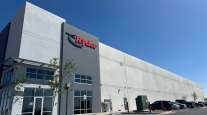Cost of Trucks, Maintenance Offers Boost to Leasing Sector

This story appears in the June 22 print edition of Transport Topics.
The truck-leasing business is strengthening this year as fleets contend with the rising cost of new trucks and maintenance, industry officials said.
Penske Truck Leasing said business has increased from a year ago, helped by fleets’ conversion from ownership, while NationaLease said it expects to grow its truck fleet by at least 10% and Ryder System also has added equipment and hiked rental prices.
Likewise, four original equipment manufacturers reported an improving market when surveyed by Transport Topics last week.
Penske’s Jack Berkeridge, vice president of sales, said the company never has had more new trucks on order as more fleets turn to leasing to cope with “the challenges of maintaining that new equipment with all the nuances that come with proper and timely maintenance.”
NationaLease President Dean Vicha said the increase in the price of trucks and the cost of maintaining them “has certainly led some folks back to the full-service leasing market.”
“Our only concern there is the OEMs are running out of slots for trucks,” he said. “That’s really the only piece slowing us down.”
Vicha also said private fleets are turning to full-service leasing because of the challenges of finding and keeping good truck technicians, and frustrations with downtime during repairs.
In the first quarter, Ryder added 4,600 trucks to its lease fleet and reported a 5% increase in both its rental fleet and rates to use those units.
In an investor presentation last month, Ryder identified several reasons for continued leasing market growth, including lower upfront costs, less risk in the used markets, redeployment of capital and resources to maintain new trucks.
Precise statistics about leasing activity aren’t kept by any trade association or disclosed by industry participants.
However, Jake Jacoby, CEO of the Truck Renting and Leasing Association, said his group’s members believe “the market is very strong. Customers in the leasing market want brand new trucks.”
He estimated that at least 35% of trucks in Classes 3-8 are leased or rented, noting that leasing lowers new trucking entrants’ costs, enabling them to take advantage of the improving economy.
Steve Tam, vice president at ACT Research, said he continues to hear that truck leasing is becoming more popular to aid financing and add short-term capacity.
Paccar Leasing Co., also known as PacLease, and others on the OEM side also reported market growth linked to technology and growing equipment complexity.
“Similar to 2014, we continue to see an increase in the leasing of vehicles with new technology related to improved fuel economy and safety,” said Mike Willey, PacLease’s director of national sales for Peterbilt Motors Co., citing features such as automatic and automated manual transmissions, as well as electronic stability control.
“Increased tonnage and higher freight rates combined with low diesel fuel prices are favorable economic indicators, which continue to keep leasing and rental truck demand high,” said Jeff Sass, Navistar Inc.’s senior vice president of sales and marketing.
However, he added the driver and technician shortages are preventing many fleets from taking full advantage of the strong economic climate.
Mike Parrish, national account manager for Volvo Truck Leasing System, said full-service lease and rental customers generally are replacing trucks and seeking contract quotes based on typical replacement cycles.
“There has been some interest from fleets that are considering full-service leasing as a way to avoid technician training and other maintenance requirements associated with the latest truck technologies,” he said.
Fleets that are challenged by increasingly complex tractor technology and higher technician training costs are making more inquiries about leasing, Matt Peterson, director of Mack Leasing System’s North American leasing and contract services.
Parrish and Peterson said the overall U.S. truck leasing market is slightly better than a year ago.
Jeff Jensen, a director at Keybridge, a consulting firm that provides research for the Equipment Leasing & Finance Foundation, said recent mixed economic reports are cooling current demand for new truck investment.
However, he noted that investment in the sector has risen 15% or more over the past five years and could improve this year with help from housing and consumer markets.
“The remainder of the year is certainly looking more positive,” he said. “Those positive economic trends should translate into demand to produce, consume and ship these goods by truck.”



